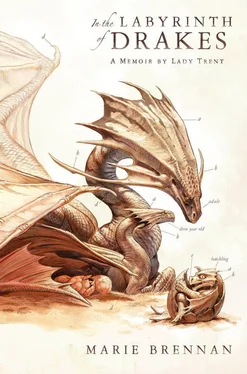Tom gestured at the piles of books on the shelves behind me. “What have you learned?”
“Quite a bit,” I said, “alternately discouraging and frustrating. Were it not for this scarf, I might have torn half my hair out by now.”
(Before I continue onward, I must issue an apology. There is no way I could conceal our predecessor’s identity; it is a matter of public record who originally held the Akhian post, and many people remember his name. I fear that what I am about to say may border on the libellous, though, for I cannot tell this tale without being openly critical of Lord Tavenor’s work. I may only hope to mitigate it by also saying that I have a great deal of respect for the man, and indeed his work—flaws and all—was the foundation upon which Tom and I built our own efforts. Without him, I do not know how we might have proceeded. Nonetheless, I am sorry.)
Tom waited while I opened my notebook and found the necessary pages. “The eggs,” I said, “are delivered to Qurrat by the Aritat—the sheikh’s people. But it isn’t systematic: when they find a clutch of eggs, they collect them, regardless of their developmental stage. This means Lord Tavenor received everything from new-laid eggs to ones about to hatch.” Indeed, one of them had hatched in transit, causing no little trouble for the tribesmen.
My description provoked a wince from Tom. “That explains one of the juveniles I saw, then. It was clearly not in sound health.”
“It likely explains several of them, though ill health may not have been as obvious in the others.” Our knowledge of dragon development was still scant in those days, but everyone with even a rudimentary awareness of the subject knew that dragon eggs were notoriously sensitive to handling. Transit from the desert to this compound had caused many to spontaneously abort, and those which did not often hatched bad specimens. The earlier in their incubation they were moved, the worse the prognosis.
If all we cared about was obtaining hatchlings, then we could have requested that the Aritat mark egg caches and return to collect them when they were nearly ready. But of course that would not solve our actual problem: presuming we could get our captive dragons to breed, we would need to be capable of incubating their eggs to a healthy finish, under artificial conditions.
The diary in front of me made a useful prop. I picked it up solely that I might drop it again on the desk with a dismissive hand. “He never went out into the field. Oh, he collected reports, and did his best to replicate the natural environment here—but it was all secondhand and guesswork. He didn’t actually know what the usual incubation conditions were, not to the degree that is clearly necessary.”
It was the way of the gentleman-scholar, which had once been widespread. In some circles it still was, though the practice—or rather, the respect accorded to it—was on the decline. Our predecessors in all fields of science had once been content to work from the scattered observations of non-specialists and the unfounded declarations of ancient writers, rather than from empirical evidence. It was truly embarrassing to think how many centuries had passed during which even our great minds had believed, without a shred of proof, that a spider would not cross a line of salt—to choose but one particularly egregious example. The exact sciences had shed that mentality some time ago; the field sciences, such as natural history or anthropology, had taken longer, and were not yet done shedding.
Lord Tavenor was of the school of thought which said that a gentleman should not dirty his hands collecting data himself. His information came from travellers, sheluhim, merchants trading in various locales. In this case he had the reports of the Aritat, who undoubtedly were keen observers of the world in which they lived—but they did not deal in the sort of precise measurements that were necessary for scientific work. And Lord Tavenor, it seemed, had not asked them to.
“You want to go into the field,” Tom said. “We can try—we always planned to try—but I get the impression the sheikh will not be in favour. It’s possible Lord Tavenor asked, and was refused.”
“If so, he made no note of it here,” I said. Then I softened. “But you may be correct. These diaries are entirely devoted to the eggs themselves, not to conversations he may have had about them.”
Tom picked up the diary, flipped through it (taking care to leave my pencil in place as a marker), and laid it down again. “At the very least, we’ll want to finish orienting ourselves here before we ask any favours.”
Which in practice would likely mean sending Tom to ask, though the prospect galled me. To distract myself, I said, “What of the dragons themselves?”
He sighed. “More of the same, I suppose. Certainly neither the sheikh nor Pensyth had as detailed a description of their natural mating habits as I would like. Though in fairness, I very much doubt Lord Tavenor would have been able to replicate those conditions even if he knew them.”
Nor would we be able to, however scientific our methodology. Among the dragons capable of flight, mating often involves an aerial dance. Allowing the same here would be a quick way to lose our captive dragons.
“What did he try, then?” I asked, for I had not yet touched those records.
I will spare my readers a full recounting of what Tom described—though interested parties can find the details in Dragons of Akhia, which has a chapter on the efforts carried out at Dar al-Tannaneen. Suffice it to say that Lord Tavenor was a keen horse-breeder (this being part of what had secured him the Akhian post), and he had applied both his knowledge and his ingenuity to the problem, searching for ways to bring together two desert drakes without them injuring themselves, each other, or their handlers. A great many restraints had been involved, and at one point he had even resorted to a process I will call “mediated by human assistance,” and leave it at that.
When Tom was done, I asked, “The sheikh is gone now, yes?” He nodded, and I stood up so rapidly that my chair caught on a broken edge of tiling and nearly fell over. “Then there is no reason for me not to go see the dragons with my own eyes.”
Tom stood as well, but with a marked lack of enthusiasm. “Isabella—I did not say.” He hesitated, one hand tapping nervously on the surface of the desk. “You saw the dragons in the king’s menagerie, all those years ago. They were runts, and easy to control. Some of the hatchlings here are defective, but not all of them, and not the adults that were captured for breeding. Lord Tavenor had to find a way to keep them. It… will distress you.”
I stilled, laying my fingers flat against my skirts. “What do you mean?”
“He tried chains and muzzles,” Tom said, clearly reluctant. “But the drakes developed sores on their hides, which became infected; he lost three that way. And two men died unmuzzling one of them for a meal—they got burned. He had to resort to other methods.”
“Tom.” I swallowed, and realized my throat had become very dry. “Delaying will not make it any more palatable.”
“The supracoracoideal tendons,” Tom said. “He cut them, so the dragons cannot fly. And he tested a method on one of the carcasses—a heated knife, to cauterize the organ that produces their extraordinary breath.”
With one hand I felt behind me until my fingers met the arm of my chair. Then I sat down again, very carefully.
“If you do not wish to see them in person,” Tom said, “then I will take those duties.”
“No.” The word came out of me of its own accord, a reflex as natural and unstoppable as breath. “No—I will see them.”
Читать дальше












